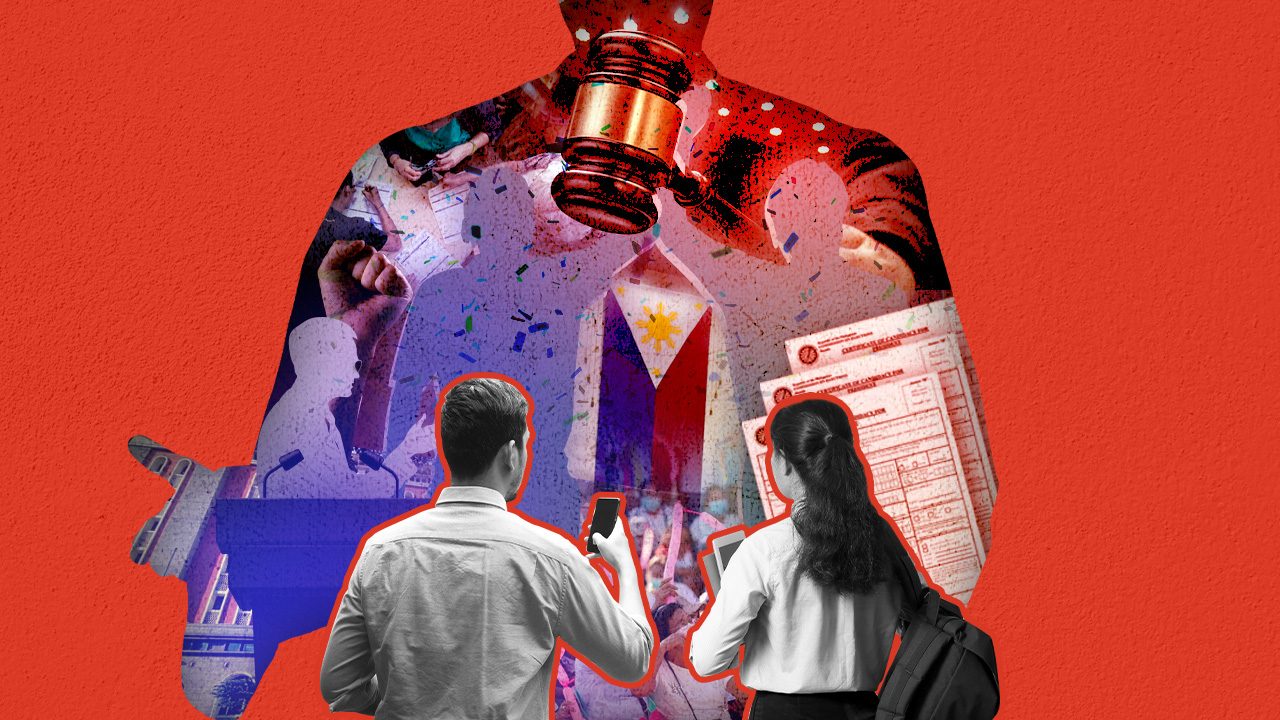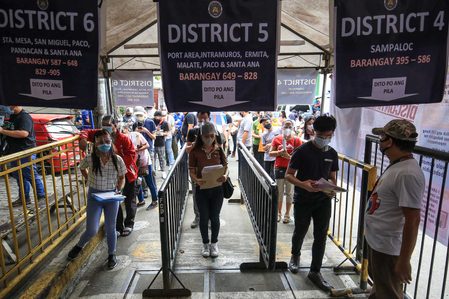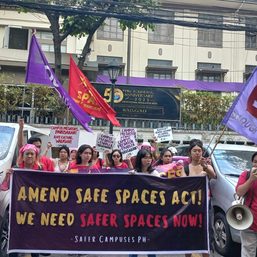SUMMARY
This is AI generated summarization, which may have errors. For context, always refer to the full article.

It’s no exaggeration to say the Filipino youth could decide the winners of the 2022 national elections.
Numbers from the Commission on Elections (Comelec) back in September showed that, of the 63 million Filipinos who had registered to vote in next year’s polls, more than half were aged 18 to 30. As of December 14, the total has shot up to 67.5 million but it’s reasonable to assume that a big chunk of that consists of young people.
In a very real way, 2022 is the year young Filipinos can make a huge and lasting impact on the country. The year 2022 is the year young Filipinos can wield the great power of deciding who gets to lead the country in the next six years.
Philippine politics has been dismissed by many as toxic, frustrating, even boring. But 2022 is the year to get political, if you aren’t already. Politics determines who governs, and governance affects every aspect of life – from how big your electricity bill is today, to the traffic jams that make you late for class, to who lives and dies in a COVID-19 hospital.
Marielle Marcaida, an assistant professor at the University of the Philippines’ political science department, explained to me how a total political newbie can take steps to be more knowledgeable and informed about the 2022 candidates and the governance issues they should be judged on.
The department runs the UP Sa Halalan 2022 initiative, which aims to educate voters about the electoral exercise next year.
“I agree that more young people are getting involved in the upcoming elections because a lot of them have lost opportunities for proper education, employment, and livelihood, and even the loss of loved ones due to the pandemic,” said Marcaida.
“This coming elections is a crucial one because the next president will be deciding our future for the next six years, which are the most formative years of young adulthood of the members of this sector,” she added.
In Chile, the youth vote became instrumental in the election of Gabriel Boric as president. Boric is just 35 years old and is a former student activist. It remains to be seen if the Filipino youth can be just as critical a deciding factor in Philippine elections on May 9, 2022.
So how can someone become more involved in politics in 2022?
Envision what kind of Philippines you want in the next six years and if any of the candidates can help us get there (Technically, there are no candidates yet, only aspirants. The aspirants become candidates once the Commission on Elections releases its final list of candidates, expected in early January.)
“For example, if you were affected by the pandemic, how will this candidate be able to help you out? If your parents lost their jobs during the pandemic, what kind of solutions are these candidates providing and if you hate thieves and liars, who among the candidates can deliver an administration with integrity?” said Marcaida.
If you care about a specific issue very deeply, you can also weigh the candidates against how you want this issue tackled or addressed. There are certain issues Marcaida thinks will resonate particularly among young Filipinos.
“Definitely how we can safely return to school, prospects for employment, climate change. This is their future we’re talking about,” she said.
You can seek out the positions of the candidates on the issues you care about or engage with groups that have been following these issues for years and see what they think of the roster of candidates or what the solution should be. Concerned about sustainable transportation? Talk to a politically-active cyclists group. Frustrated by contractualization? Reach out to labor rights groups.
Once you’ve immersed yourself enough in the issue you care about, you’ll find that you can better evaluate candidates’ promises regarding that issue. Did they just make a motherhood statement or is the policy comprehensive and well-thought-out? Will their proposal satisfy many aspects of the issue even if it’s not the perfect solution, even if it might not please all groups? What are you willing to compromise on so that there’s progress on addressing the problem?

Get to know the candidates, their platforms, and track record. Social media and the internet can help here. Most aspirants will have their official Facebook, Twitter, or YouTube pages and websites which should have their resumés and bullet-point agenda or platforms. Read their posts and watch their videos (some of the aspirants are on TikTok) to get a sense of their personality and the way they think or the image they want to project. Yes, this is curated content but it helps to get an idea of how candidates want you to perceive them. It says a lot about who they are and what they want to achieve. Take note of what they aren’t saying in their official accounts, issues they aren’t addressing, controversies they aren’t mentioning. What they leave out says just as much, perhaps even more, about themselves than what they include.
But Marcaida also suggested tapping our “organic networks” of information – family members and friends who already support a candidate and can explain why they’re for them, classmates and office mates who are somehow connected to a politician or who have first-hand experience of how they act or lead. You can pick up a lot from personal anecdotes (just make sure they aren’t fake!).
Read and watch the news every day. News articles about candidates and what they are saying and doing are a necessary complement to reading the candidates’ official social media pages or asking their supporters about them. The latter is how candidates want you to perceive them. News shows you the candidates as they are, the good and the bad. The journalists behind the news piece is supposed to include context about what the politician is saying. Is the candidate making an unrealistic promise? How does his or her proposal compare to what’s already being implemented by the government? Is he or she lying?
Most news outlets have already assigned specific reporters to cover specific presidential and vice-presidential candidates. Follow these reporters’ Twitter accounts to get a daily feed of what the candidates are doing – from their speeches at campaign rallies to their relief efforts for the latest disaster. Reporters often tweet their articles or video reports so you get access to their packaged news outputs too.
Watch out for journalists’ interviews with candidates. Journalists are trained to ask tough questions, catch inconsistencies or fallacies in their interviewee’s responses, and zero in on an issue or fact the politician is glossing over. Interviews with journalists test a politician’s mettle and can often reveal if they came prepared, how confident they are of their proposals, how calm and collected they are under pressure and scrutiny, if they have substance or are just empty husks – things you’d like to find out about a future president.
Watch the debates. In every election, you can expect a group – whether a news outlet or civil society group – to hold a debate for presidential, vice-presidential, and senatorial candidates. In the 2016 national elections, the Commission on Elections even hosted a series of such debates, a first since 1992. Debates are a golden opportunity to see the candidates side by side, interacting with one another, and discussing the same policies or pressing national concerns. Rappler columnist John Nery said the 2016 debates were a game-changer and may have helped Duterte win the presidency. Debates are popcorn moments to size up a candidate, how they deal with jabs from their election rivals, how they communicate under time pressure, and even the chemistry between tandems or rivals.
Apart from what they say and do now, during the frenzied campaign season, take time to find out how they performed in previous government positions they held. More than their promises, their past actions are a good measure of how they will govern in the position they are now aspiring for.
“Were they productive in delivering services beneficial to the general public or were they always absent? Did they author anything that helped a lot of people or were they responsible for bills that attacked certain sectors of society?” said Marcaida.
What values do these candidates seem to hold dear? They may say lying is no big deal because all politicians do it anyway. They might say killing someone is okay as long as they are criminals. What values do you want the future president to embody, given that they will become the most powerful normative force once they occupy Malacañang?
Have healthy discussions about 2022 candidates with others. It could be with your family, your workmate, the Grab driver bringing you to the grocery. Conversations can make us see things in different ways, test our thinking processes about candidates, or convince others to support the candidate we like. But political talk can also be quite polarizing and divisive, if we let our emotions and prejudices get in the way. When talking about elections, make sure the person you’re talking to wants to engage in the discussion just as much as you do. Keep your language polite, no name-calling or judgment. Be open-minded, but stick to your values and principles. Noreen Capili, who used to support President Rodrigo Duterte and who is now campaigning for Vice President Leni Robredo, has tips on how to talk to friends who may be on the other end of the political spectrum.

Election Day: Decision time
After your research and soul-searching, you might find yourself wholeheartedly ready to support a specific candidate or candidates. You might even think of helping their campaign or joining their campaign teams. Most of them will have numbers or emails to contact on their official pages for anyone who wants to volunteer. Just be sure that, when you do throw yourself into helping a candidate, you’re doing so because of your values, not anyone else’s. There might come a time, in 2022, that you lose faith in your candidate or think they no longer embody the leader you want. That’s okay. You can step away and support another candidate. You’re not beholden to any one of them.
It’s also possible that you might not have settled on a candidate on the week of election day, which falls on May 9. That’s okay, too. But it’s important to set aside time to really study the options and arrive at a choice you’re comfortable with. Draw up an Excel sheet comparing your top candidates, do last-minute consultations with people you trust, weigh the pros and cons of going with this candidate versus the other. By election day, you would already know which candidates have no chance of winning or which candidates will likely go head-to-head. You could decide that, as a matter of strategy, you could go with your second choice candidate because you don’t want the frontrunner to win. That’s a valid decision.
The 2022 election season will be a roller-coaster ride, not only for politicians, but for voters as well. But we’re in this ride together and will reach the same end. Hold on tight. – Rappler.com
Add a comment
How does this make you feel?






There are no comments yet. Add your comment to start the conversation.